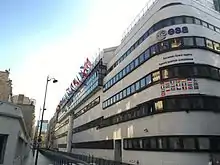European Space Agency
European Space Agency or ESA (ESA; French: Agence spatiale européenne, ASE) is an international organisation with 22 member countries. Its job is to explore space.
| |
 ESA Headquarters in Paris, France | |
| Abbreviation |
|
|---|---|
| Formation | 30 May 1975 |
| Headquarters | Paris, Île-de-France, France |
Official language | English, French and German[1][2] |
Administrator | Johann-Dietrich Wörner Director General |
| Guiana Space Centre | |
Parent organisation | |
Budget | (~US$6.43 billion) (2019)[3] |
| Website | www |
Its headquarters are in Paris, France. ESA has a staff of more than 2,000 with an annual budget of about €4.43 billion / US$5.51 billion (2015).[4]
The member countries of ESA are Austria, Belgium, Czech Republic, Denmark, Finland, France, Germany, Greece, Ireland, Italy, Luxembourg, the Netherlands, Norway, Portugal, Spain, Sweden, Switzerland and the United Kingdom.
ESA's space flight programme includes
- human spaceflight,
- the launch and operations of unmanned exploration missions to other planets and the Moon,
- Earth observation.
- running a major spaceport, the Guiana Space Centre at Kourou, French Guiana,
- designing launch vehicles.
The main European launch vehicle Ariane 5 is operated through Arianespace with ESA sharing in the costs of launching and further developing this launch vehicle.
References
- "Languages". Retrieved 5 November 2017.
- esa. "Frequently asked questions". Retrieved 20 August 2017.
- "ESA budget 2019". esa.int. 3 February 2019.
- "ESA Budget for 2015". esa.int. 16 January 2015.
This article is issued from Wikipedia. The text is licensed under Creative Commons - Attribution - Sharealike. Additional terms may apply for the media files.